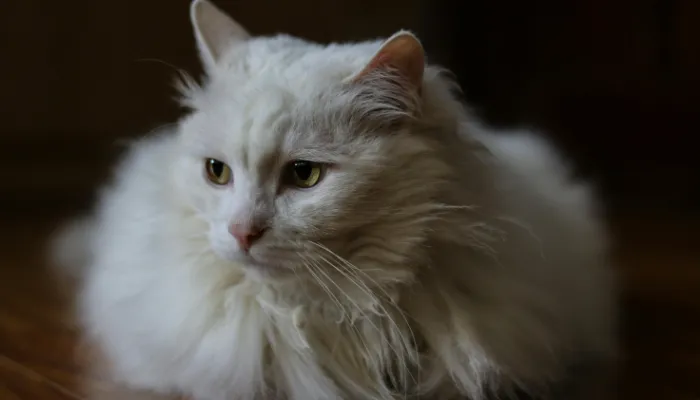When you’ve had an altercation or a speech-related struggle with your cat, you must have wondered, How do cats say “I’m sorry”? Cats may not understand humans as well as we do and so their behavior tells much about them. A cat translator may be of help in interpreting their movements, but an understanding of these signals can let you know when your pet is saying sorry.
Cats always have some way or the other to apologize for their mischievous actions when they destroy the house or scratch your face playfully. In this blog, we will explore how do cats say “I’m sorry”, identify the factors, and strategize what can be done to enhance the interactiveness with your pet.

Understanding Cat’s Language of Apology
Without knowing how do cats say “I’m sorry”, let’s first get acquainted with some general aspects of cat actions. Cats are not like dogs when it comes to showing their remorse, which is largely achieved in a submissive manner. Cats are more self-governing and nuanced when reacting. All things considered, cats are perfectly capable of showing emotions such as guilt or regret, through their body movements, sounds, and actions.
- Communication through Body Movements: The body movements of cats are the first telltale sign they use when communicating, and which is also the main channel through which their feelings are expressed. Their tail, ears, and overall body stance are bound to tell you how your pet is feeling and when they are feeling sorry.
- Vocalizations: To express their emotions, cats may softly meow or purr, seeking comfort or reassuring that they intend to apologize.
- Actions: A few cats may engender some form of act such as rubbing themselves on you or bringing you a ‘gift’ which could either be a mouse or a toy as a form of apology and affection.
Apologies expressed by cats can be complicated, but knowing how a cat expresses feelings can help you understand how they wish to apologize. With these insights, the next time cat engages in these behaviors, you will understand he is trying to say sorry.
Cats’ Physical Apologies
When pondering on how do cats say “I’m Sorry”?, more often than not, their behavioral tendencies are a good expression. Indeed, a cat’s body language does speak more than words would. These not-so-obvious signals can be taken as an apology.
- Head-Butting: When cats rub their body against you with their head it is one of the most familiar ways in which they apologize or show some affection. This type of nonverbal communication most which does not need words is called bunting.
- Kneading: When a feline starts pawing on any surface for comfort, enjoy the moment. Also, you should know that it shows affection when a cat kneads. Adult cats too knead, both as a sign of remorse and contentment. This motion depicts the kitty’s comfort level. This behavior is naturally observed in kittens during the nursing stage when they suckle their mother.
- Tucking in the Tail: If your cat opts to hide its body beneath a crouched position and tucks its tail within, chances are that they are feeling guilty. This form of body language usually indicates submission and suggests that they are trying to apologize for some perceived wrongdoing.
- Slow Blinking: If your cat looks at you and is about to blink slowly, you can assume that trust and affection is being communicated. If the kitty blinks at you slowly after an altercation, it may be their version of saying sorry.
Animals give authentic attempts to mend errors and, in the process, show affection. These actions are the cat’s clear motive for making things right and restoring your bond. In other words, when you spot such gestures, it indicates that the cat is craving reconciliation.
Vocalizing Apologies
As opposed to body language, vocalization is usually a more convenient way for cats to express their feelings. In answering the question, how do cats say “I’m sorry”, cats, in general, can do anything from soft meowing to purring, both of which can be used to apologize.
- Gentle Meowing: If your cat gently meows at you, they could be seeking your attention or trying to let you know they are feeling remorseful.
- Purring: This is often a signal of satisfaction and rest, but they can also use it to signal the need to calm and placate you. Some felines purr for various reasons, and some of these may include: wanting to apologize after an argument.
- Chirping and Trilling: When seeking attention or even keeping the peace, some felines can produce a chirp and trill sound. Accompanied with a head-butt or body rub, it’s a sweet-sounding gesture.
Words are one of the fastest ways cats can show their feelings, and it is no different when it comes to apologizing. You should respond to your cat’s apologies using a calm, reassuring voice to help them feel safe is all you really need to do.
Apologetic Actions
This comforting action can also be part of how do cats say “I’m sorry” After an incident like a fight or any distressing moment, your cat may soothe ‘you’ in their own way:
- Lying On You & Cuddling: During softer moods or when they need to show remorse, the cats move to their humans. If your cat cuddles with you on your lap after an incident, this could also be a way of her saying she’s sorry.
- Delivering To You Some “Gift”: Appealing to many cat owners is the hope that their cat will bring them something – a toy for example, or, in some cases, a small animal they’ve captured. As baffling as it is on the surface in some cases, it is simply a way to apologize.
- Hanging Out By Your Side Now and Then: If you’ve recently had an argument with your cat and now they seem extra clingy to you, they are trying to put an end to the tension with their cuts and cuddliness.
The above behaviors are attempts made by the cat to break the stress between the human and themselves and show that they care about the relationship. It also helps their owners to strengthen the relationship.
Conclusion
Therefore, how do cats say “I’m sorry”? Even if they do not understand human language, it is evident that remorse is shown via actions. Cats are known to express it using a head-butt, soft meows, and gentle purring.
By knowing these signs, you can understand your cat and strengthen your bond. The next time your cat seems to apologize, you will understand what it means!
